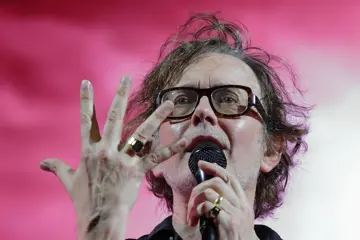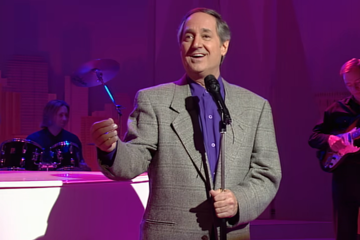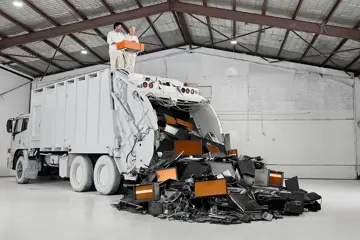To understand the world Deena Lynch, professionally known as JAGUAR JONZE, has created over the last two years, you must step outside the constraints of traditional music artists. Having developed as a dialogue for her subconscious, she also developed two other separate dialogues (or cities within the Jonze world as she likes to refer to them): one for others and their journeys with mental health through visual art and illustration as Spectator Jonze, and one for a dialogue with the body through photography under Dusky Jonze. Together, these three worlds combine to represent an unleashing of creativity, bravery and vulnerability that almost didn't exist at all.
Lynch has created and released music in the past, but it wasn't until two years ago with the first release under the new moniker Jaguar Jonze that her newly refined vision and freshly galvanised creativity began to capture the attention of many. With 'You Got Left Behind', it was a bold artistic statement and a clarion call for all who could hear it: Jaguar Jonze had arrived. From here, Lynch went on to release single after single and began a list of achievements that has steadily grown in the last 18 months as well. From being one of the most talked about acts at last year's BIGSOUND to selling out her own shows, supporting the likes of Ocean Alley on tour to competing in Eurovision: Australia Decides and winning a Queensland Music Awards, the name and world Lynch had created for herself in order to truly express herself was being heard more and more as fans and critics alike praised her for her unashamed vulnerability, her unique voice and her entirely relatable personality (despite how intimidating she might look on stage).
There's an openness Lynch has with her fans who she now describes as her family that is so rare within music. In a world where social media accounts are run for artists by managers and when we're all afraid to truly be ourselves online in all our messy glory, as Jaguar Jonze, Lynch promotes self-expression at its most pure through her music. From openly discussing the traumas she experienced as a child and her consequent diagnosis with complex post traumatic stress disorder to more recent events including a personal account of sexual harassment, Lynch might indeed shed light on these issues but by doing so she repositions herself not as a victim but as the one in charge. She takes the power away from things that have rendered her powerless, and in doing so not only inspires her fans to do so, but herself as well.
Fast forward to April 2020 and Jaguar Jonze has released her eagerly anticipated debut EP, Diamonds & Liquid Gold. She released it while in hospital, having been taken in an ambulance after concerns of her recent COVID-19 diagnosis, and still remained as generous as ever with her adoring and now-very large fan base. Even her decision to share that she had contracted the virus that has changed everyone's lives across the world while she was in the US for some very important shows (most of which were cancelled) was one that was applauded as she rebuked any kind of stigma with her honesty and transparency.
Don't miss a beat with our FREE daily newsletter
Diamonds & Liquid Gold is a sonically impressive odyssey that marries indie rock roots and spaghetti western stylings with the drama of a Tarantino film, and uses imagery that pays tribute to Lynch's heritage. It's an incredible solid representation of her vision for her project, and one that proves she is absolutely deserving of the hype she is rightfully receiving. There is no question that as she continues to grow, the world of Jaguar Jonze and its sister projects is one that will also grow too. And in a time that needs us to embrace our vulnerabilities and our flaws and reclaim our power back from things that should no longer define us, this world is more vital than ever. Thankfully, when I sat down with her over Skype ahead of the EP's release, I got the impression that Lynch has no intention of slowing down or stopping any time soon and in fact, she's really just getting started.
People rightfully commended you on sharing that you were positive for COVID-19 and your experience so far. It seems that your whole trajectory as Jaguar Jonze has been marked in bravery, taking stands for things and being incredibly open with your fans — does it feel like that for you, or is it just something thats happened along the way?
It was never orchestrated that way, ever. It's just me as a person, bleeding out into my daily exchanges or how I want to communicate. The truth is even with the COVID-19 thing, I was just doing it because I wanted to share it. I feel like my fans are part of my family and my support networks and I was just saying it because I just wanted to say, "Hey, if I'm quiet for the next few days, it's because this is what's going on." I think everything I do with my art and my music, I just try to embrace art and vulnerability and take the power away from shame. I always try to make the best example of being honest, open and vulnerable and that translates into sharing stuff that maybe people don't normally do. For me, I don't think of as much. It's just integrating it into my very core of who I want to be with this project.
The core of the whole project is about confronting shame and taboos, and diving into the human psyche in all its fucked up, messy, brilliant glory. Has tackling the human psyche in general head on made you less afraid of your own now?
It's 100% why the project started. When I say, "Tackle the shame and undo those taboos and embrace your vulnerability," it's because I was that person. I was that person that was so riddled with shame. I was that person who was so insecure that I was afraid to put anything out there and didn't want to express myself. I mistook vulnerablity for weakness and I think by trying to flip that around, it's been these baby steps of opening one door to another to another, and soon it's just wide open. Garage door's flipped up and it's a house party like, "Welcome to my brain!" And obviously I'm still working on compartments of it but for me it's been a mental health journey for myself and as I open these doors and let people in, and as they generously share back with me, it's become this give and take exchange. I learn from them as well and that propels my growth in my mental health journey. It's not been me at the forefront, it's literally these tiny exchanges with whoever it may be, even people I've never met who have given back to me and I've learnt from them. It's this cycle and it's made me realise that if we were more like this as a society, there would be way less of a burden on ourselves internally solo in our own times, and we'd all be able to spend more of our energy on things that matter and things that should count.
I think what draws so many people to your music is that level of power in your vulnerability. Something I really love with music is how powerful you truly become when you're not afraid to be vulnerable. I think that's what the whole "fierceness" of the Jaguar Jonze project comes down to is the complete refusal to be afraid of being vulnerable, and it's because of that that we now have this larger than life character. Does it feel like that on your end?
There definitely is a whole other world but it is inside of me anyway. It's not like I'm going to be fierce 24/7, but I think when life throws adversities in my face, I'll take it in the same manner as Jaguar Jonze does on stage - except it'll just be in how I process that adversity rather than a whacky dance move. That behaviour of Jaguar Jonze and how she might process things is exactly how Deena might process things now. Even though it comes across fierce and ferocious on stage, it's actually my most vulnerable side and that's the weird irony of Jaguar Jonze.
You speak about your projects in relation to being different types of dialogue. This is quite interesting as you discuss your childhood and your experiences as being frozen into being speechless. Do you think that as you learned more and more about your own mental health, it’s allowed you to want to have these kind of dialogues now?
It was definitely a conscious decision of mine. I'm pretty open about how I suffer from complex PTSD and even though you see this side of me where I've been able to have those dialogues and conversations, a lot of effort has happened behind the scenes to break old structures for me to be able to do that. My normal instinct -and it still does happen- is to freeze, play dead and shut down. In those moments, I've now got an awareness of myself and I can go, "This is not right, Deena what do you need to do when you're in this situation?" And it's like, "Flip it. Flip it, flip it, flip it. Break out of it, force yourself to talk and force yourself to unfreeze." My music and my art is a constant practice of the complete opposite to make sure that I change my survival mechanisms from freezing to fighting. It's obviously said than done but I know. It's been a really long and difficult process, but what I realised is I let trauma define what the rest of my life will look like and that's not fair because it's my life. Even though it sucks that you're the one that has to take control and face these really difficult moments of what the trauma has brought about in you even though you didn't bring the trauma onto yourself, it's not your fault. You really do have to take control of it and once you get through the thick of it, you'll realise, "Why didn't I do this earlier? I do deserve this and I don't know why I was giving so much energy and power to that trauma because this is a much better side of the mountain to be on."
Your music is so in touch with your own experiences, and obviously these songs have been around for some time. I’m curious to know if given now the songs are out in the world, is it like reprocessing it all over again?
I think it serves as reminder of where I can from and what place I was in, and to just sometimes go, "Oh yeah, I remember that." It's a bit of a time capsule. It serves as a reminder of what I went through and where I am now and to congratulate myself on it.
Do you feel there was a point where you liberated yourself enough to be this creative?
You've known me long enough to know I wasn't always like this, and it was because I was so insecure. I was so afraid and I didn't think that I could cut it. That anxiety and shame and insecurity always pushed it down. I think that creativity always existed, but the difference is that I just liberated myself and let that come out. I no longer care about what anyone else thinks. I think the best way to put it for me is I was in a toxic environment and when you put a flower in a toxic environment, of course it's going to wilt and die. But if you put that flower in a different environment with sunshine and water, that flower can exist in its best form. That's how I see it. It has taken a while for people to understand, accept and embrace it. I knew I was a little bit left of centre but it's fine because that's what I wanted to do. When you stop fretting over what people think and you're just doing it for yourself, maybe it's a longer trajectory but I don't care because I'm playing a long game. I want people to not like me because I'm the trend right now but like me because of the world I've created and they want to be apart of it. I think that's been my decision making behind Jaguar Jonze. This is me, it's truly me and I invite people to join it or not. Whether they do or don't, I'll keep going because I need to for myself.
I think the thing I love most about your projects and your music is it’s real. It’s raw. Because it is so authentic, you must have a lot of people talking to you and reaching out about their own experiences as well. Does it ever weigh on you now thinking that there’s this extra layer or responsibility to your music?
Yeah. It's going to be a journey and I take each thing as it comes, but one of the things I've had to learn is boundaries. Boundaries is something we all really need to learn but it's not something we openly talk about. The fact is, I gave too much of myself early on because I empathised with everyone. Especially with projects like Spectator Jonze, people are really opening up to me and I took it on for them too much at the start and it was too much for me. I probably still do that a little bit but the difference is I'm trying to learn boundaries now. I want us to embrace our vulnerability and face the truths of what we may be battling with, but you have to take responsibility for yourself and you can't put that on other people. If you can't, then you need to start looking techniques and tools to be able to do that for yourself. I try and draw those boundaries quite firmly for my own wellbeing and for their wellbeing. Otherwise it's enabling a behaviour that's unhealthy. It's been really hard because people give me a lot of their vulnerabilities but it's always this delicate balance. I always try to make it quite clear that boundaries are super important.
Do you think having each project separate means you’re less likely to burn out creatively? You can kind of still create and move onto a different section if one is particularly difficult at the moment?
When I first started the projects, I didn't really plan the separation of them. It just happened because I just thought that people who are fans of my music don't necessarily have to be fans of my art. People who are fans of my art don't necessarily have to be fans of my photography. Obviously there's a lot of overlaps and people do jump between the different worlds but the truth still remains that people aren't a fan of everything and that's fine. They're so different. If I put that in one place, I feel like it's overstimulating for people and myself to go, "What is going on here?" I was able to clearly separate and give them the respect of the little cities that they are as themselves within the same world. Now, when I am getting really exhausted and run down from Jaguar Jonze stuff, I still want to be creative so I go and do my Spectator Jonze stuff. I think it's healthier for my head and there's different ways to express and be creative, and I've now find my pockets of that so I can jump between as I feel like it. It then always feels like a refresh.
Has there been a particular highlight for you over the duration of Jaguar Jonze?
Building this world that is very personal and vulnerable to me, and realising that it resonates with people. Watching that grow has been a very rewarding process. Also, I was doing this for myself but I didn't realise how important it would be for other people and that's something that has been a really touching experience for me. It reminds me why it's so important for us to feel connected and the fact people can feel connected to what I create is, I feel like it's success. I think the main thing that I take from these projects is yes, I'm the artist, but all of them cannot exist without collaboration. I need people to make collaboration happen and it's everywhere and around me. I feel really grateful that these Jonze worlds can grow because people want to collaborate with me and put in their own expression and creativity to help fuel the projects. I feel really touched and grateful for that.
Diamonds & Liquid Gold is out now.
Interview by Emma Jones
SEE ALSO
HOW JUNO MAMBA FOUND HIS PLACE WITH HIS DEBUT EP, 'LIGHT ECHOES'
IT TAKES A VILLAGE: THE MANY MOVING PARTS OF NERVE
COMMUNITY, COLLABORATION AND 'COMPLEX CLARITY': IN CONVERSATION WITH ANDY GARVEY
















